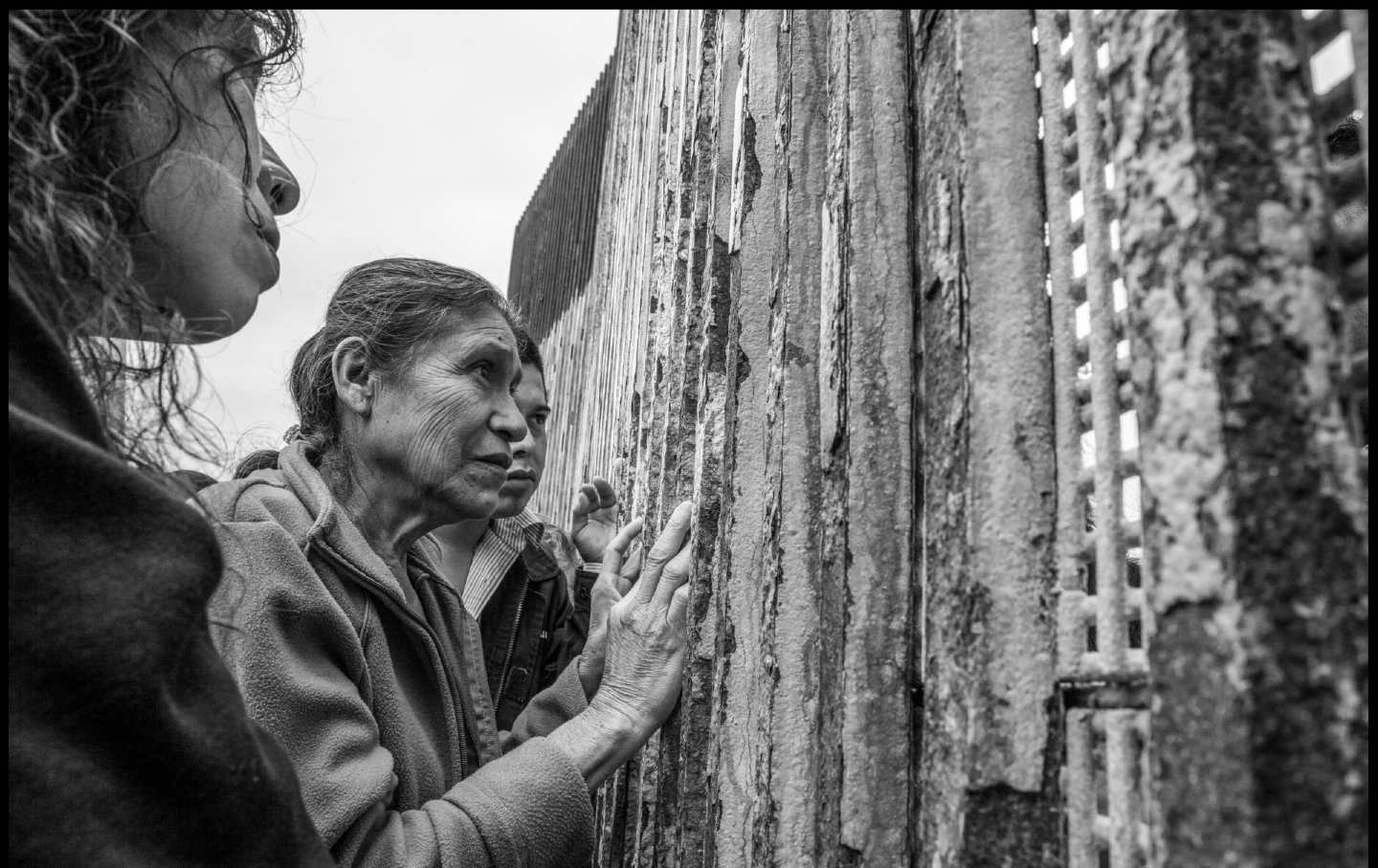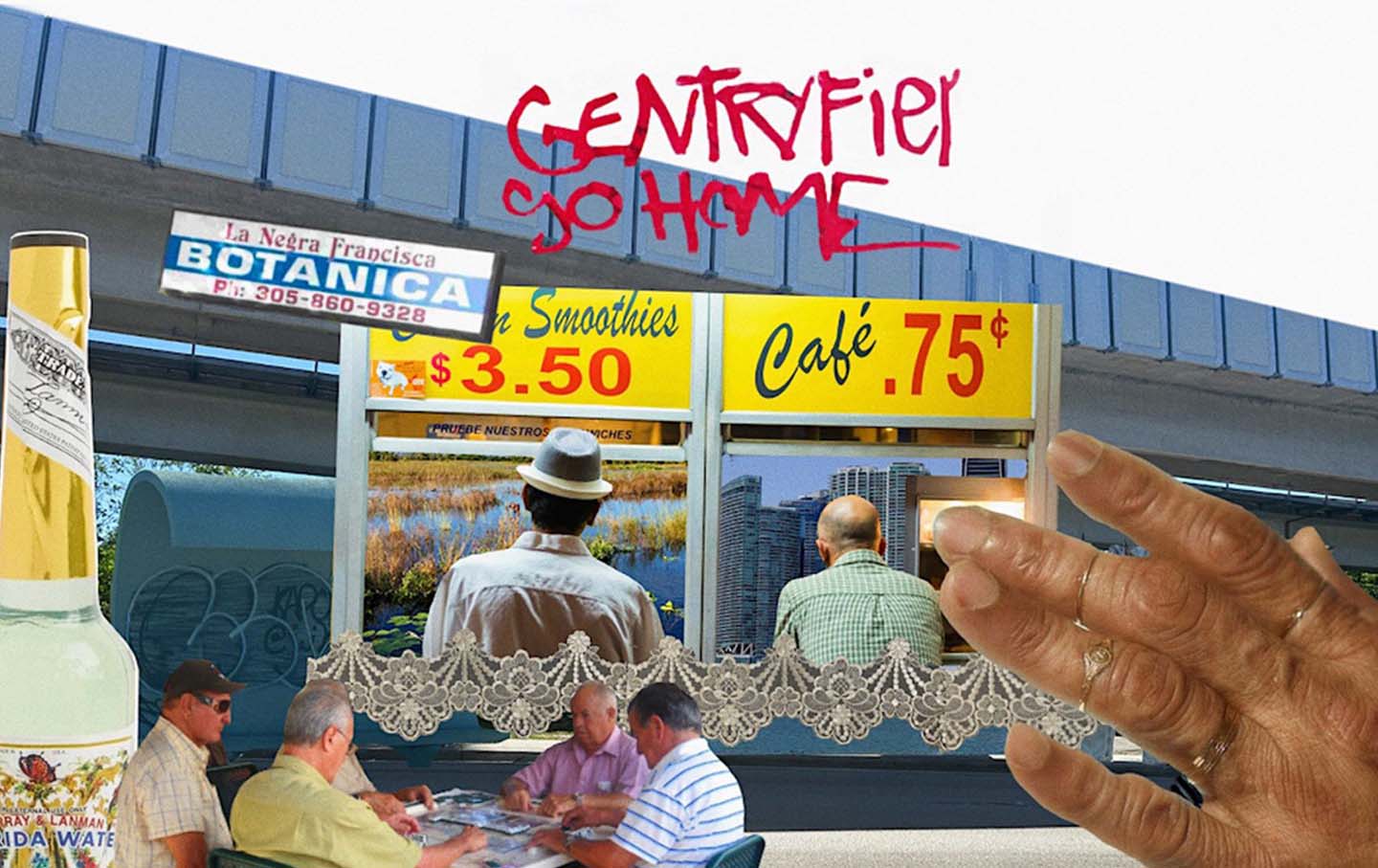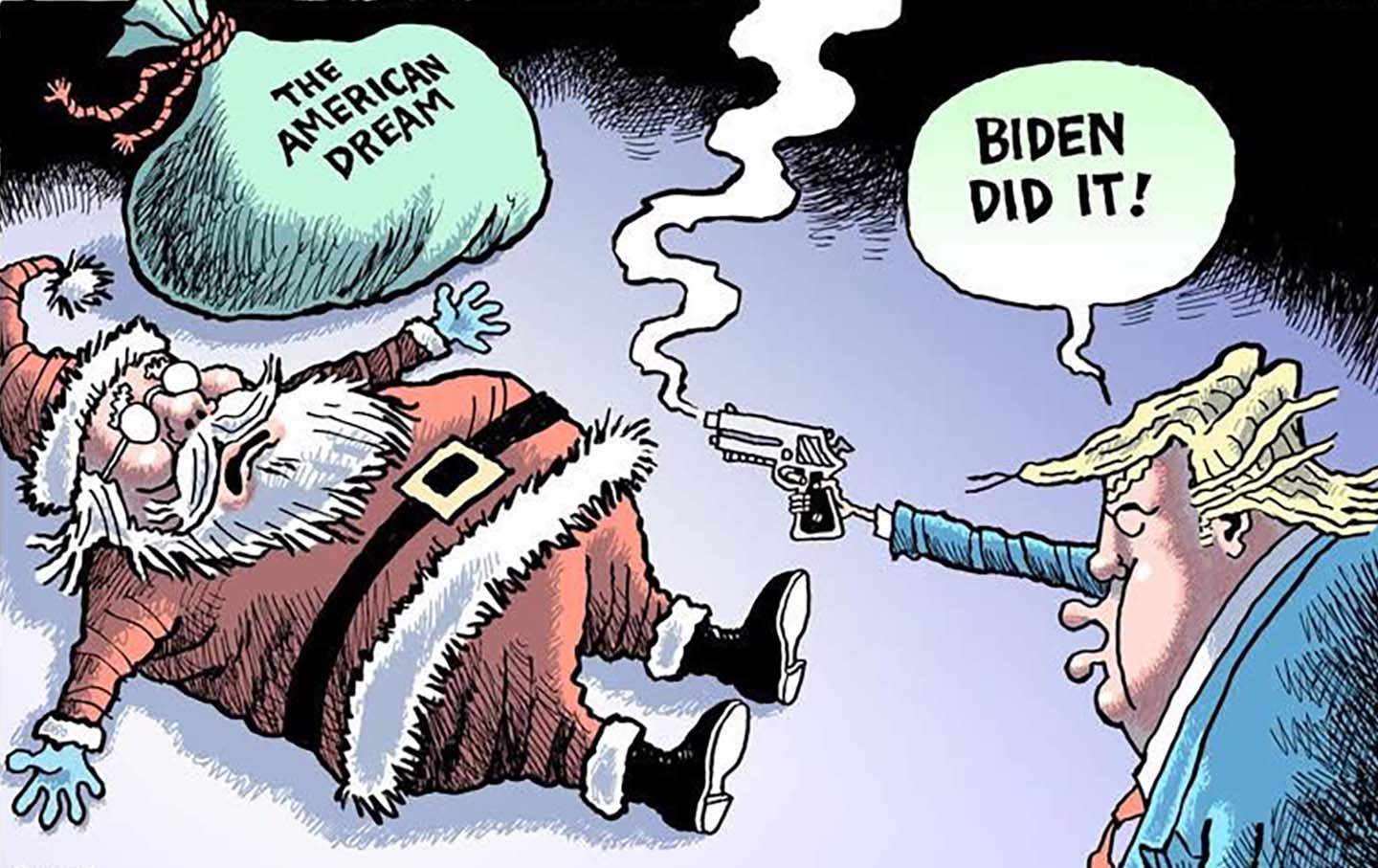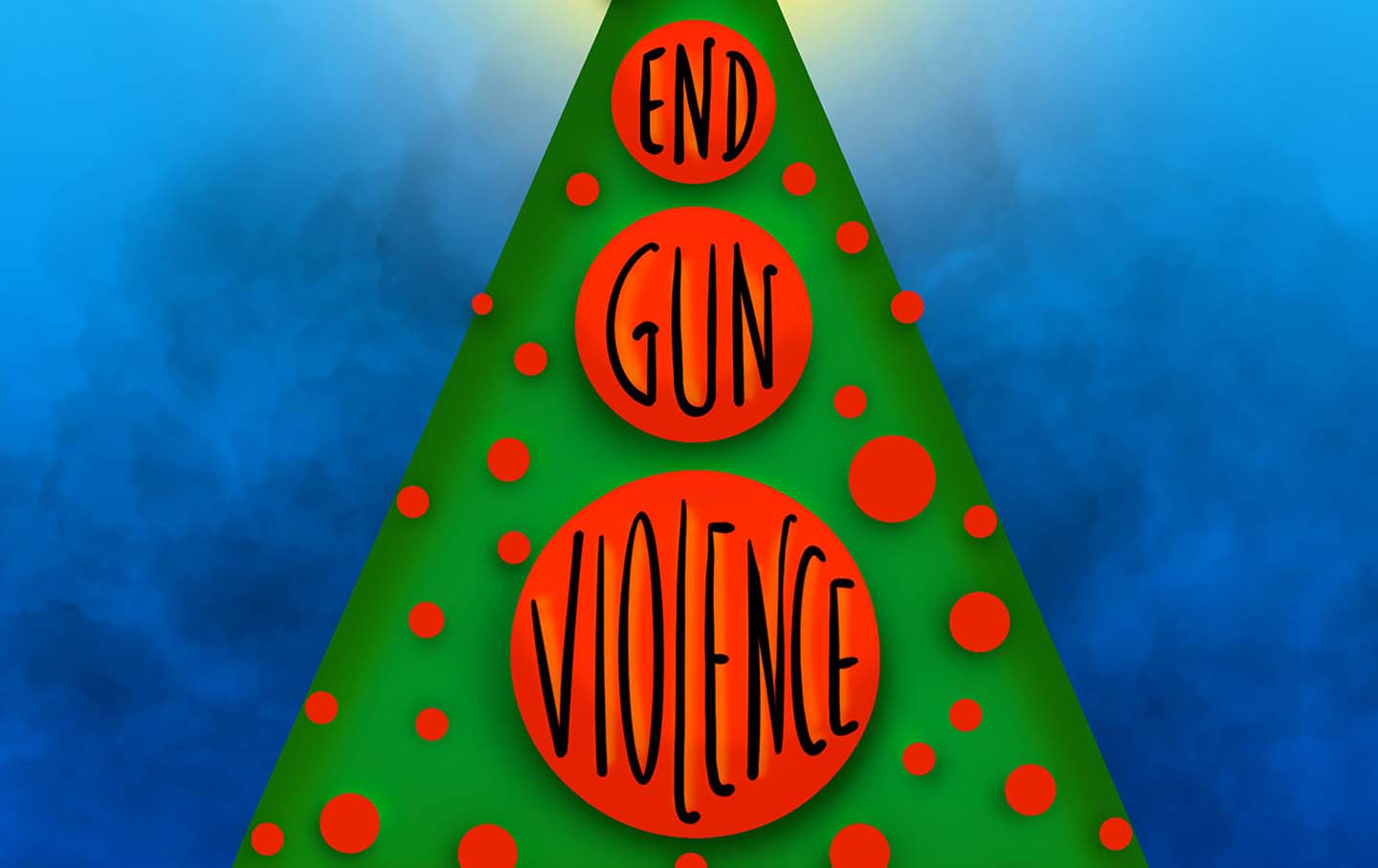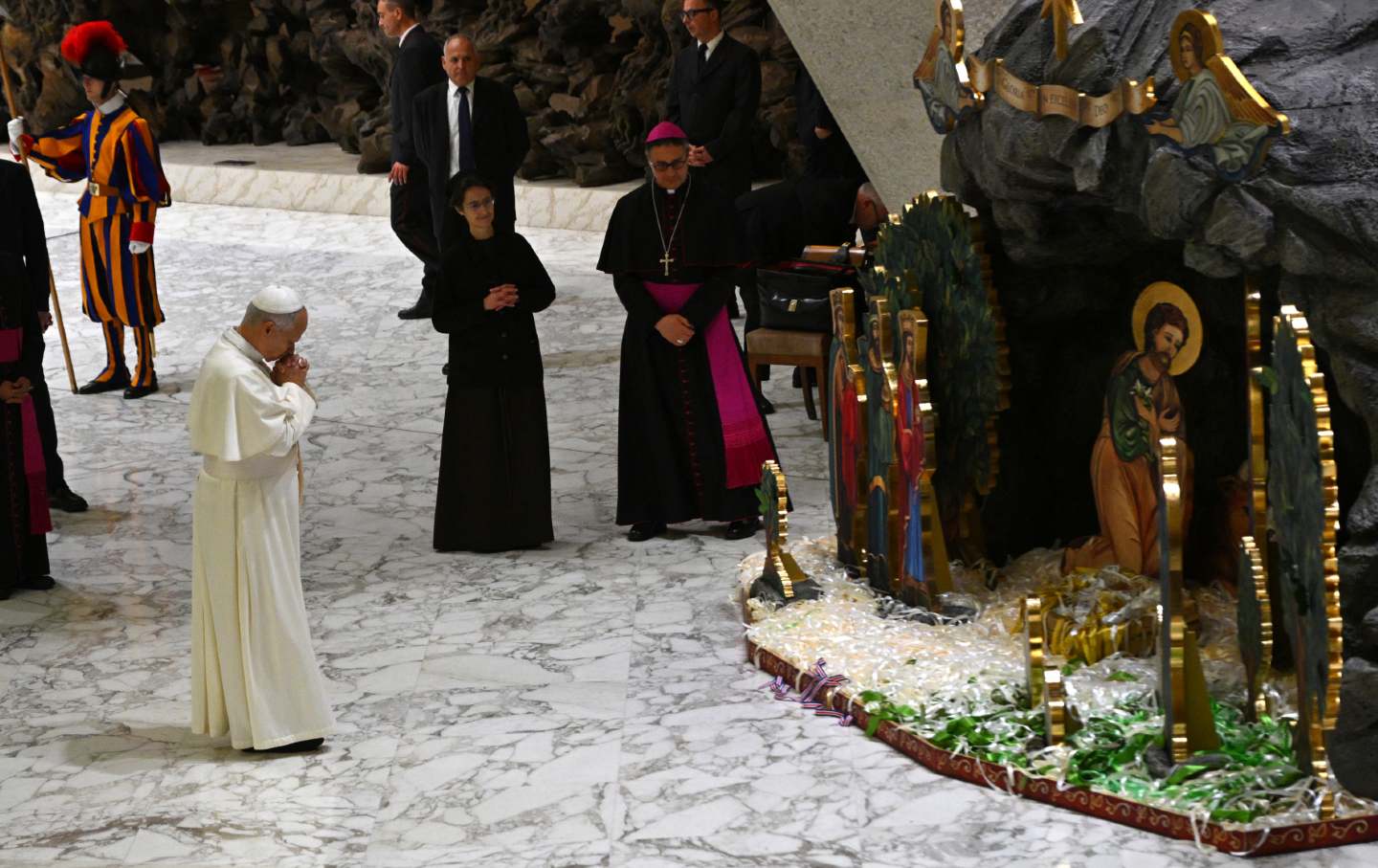Gavin Newsom Is Creating a Disaster for Unhoused People
The governor’s order to sweep California’s encampments will please his constituents—and perpetuate the homelessness crisis.
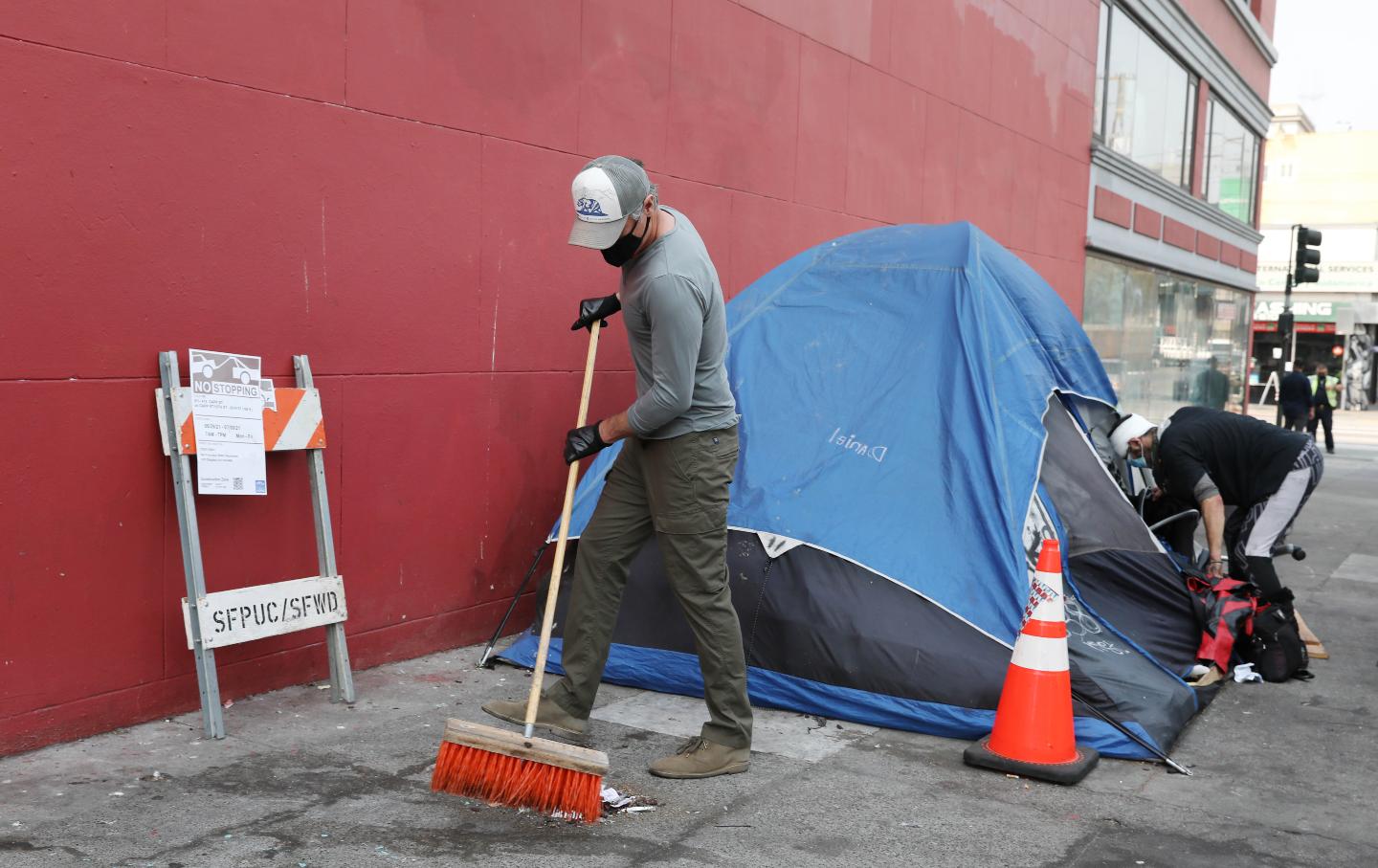
Governor Newsom visits a homeless encampment on 19th Street in 2021.
(Lea Suzuki / Getty Images)
California’s two most marginalized constituencies, its homeless and its imprisoned, each represent about half a percentage of the state’s 39 million residents. Both groups are vulnerable to abuse and untimely death, suffer from the deprivation of vital resources, and have little say in political discussions about their future. Black people are notably overrepresented in each category.
There is a reason the latter population passes basically unremarked upon and why the former is considered the marquee problem of the state, synonymous with the supposed crisis of California itself, mocked endlessly by the right, and invoked as a reason for the so-called “California exodus” of businesses and working residents. It’s quite simple: We can all see how bad it is. Most Californians will never set foot inside a prison or a jail, but the blunt reality of the homelessness crisis is in all of our faces; it testifies from our sidewalks and street corners, our underpasses and our parks. In a way, it’s fitting that those who have failed to meet the punishing requirements for even renting an apartment in this state should pitch their tents on public land. Their presence there attests to a communal failure that cannot be ignored.
Housing people is one way to remove them from sight, but it is slow, painstaking work, and officials’ preferred method has often been something brisker: the encampment sweep. This is magical thinking as policy—the idea that homelessness can be addressed by simply seizing unhoused people’s possessions, jettisoning their makeshift structures, and forcing them to move on down the road. Sometimes, sweeps come with civil or criminal penalties: San Diego Mayor Todd Gloria has made a policy of “progressive enforcement,” or arresting homeless people to compel them into shelter. “If they don’t want to use them, it’s a free country, I understand that,” he has said. “But it’s not without consequences.”
Sweeps happen every day, on streets across the state, as a matter of course. But last week, their flawed and brutish logic was ratified at the highest levels of California government when Governor Gavin Newsom used his executive power to order officials across the state to clear homeless encampments from public land.
Newsom’s order follows the recent Grants Pass v. Johnson Supreme Court decision, which held that citing homeless people for sleeping outdoors is not a violation of the Eighth Amendment’s prohibition on cruel and unusual punishment, even if those people have nowhere else to go. Some state agencies under the governor’s command are primed to act immediately. And while the governor cannot force local officials to clear encampments in their cities, his dictate heaps additional pressure on them. “No more excuses…. Now it’s time for locals to do their job,” Newsom wrote in a tweet accompanying the announcement. Certain leaders, like Los Angeles Mayor Karen Bass, who has made a transitional-housing initiative her calling card, albeit with limited success, may be reluctant to ramp up removal and enforcement efforts. Others, like San Francisco’s London Breed, who has used her public position to realize what appears to be a personal desire to never cast her gaze upon a homeless person existing in public, will be eager to follow suit. “San Francisco is already doing what the Governor is calling for,” she wrote last Thursday.
Back in 2022, the week that the Roberts Supreme Court ruled on both Dobbs and West Virginia vs. EPA, Newsom denounced the same justices who ruled for the city of Grants Pass as “hell bent on turning back the clock and ignoring reality.” But “ignoring reality” is precisely what this executive order does. We are getting down to biological imperatives here: the necessity of sleep; the fact that a person cannot just disappear, no matter how many times you roust them from their tent or take away their few personal belongings. A recent RAND study of homelessness in LA found that cleared encampments generally returned within months, providing only further evidence that this strategy is not a long-term solution.
As Newsom sets his eyes on the White House for 2028 or 2032, he knows that California’s housing and homelessness crisis is a massive political liability. His executive order gives the governor a retort ready-made for a presidential debate stage a few years hence. It’s a predictable continuation of the both-sides game that Newsom has been playing his entire career, and which he expects to elevate him to national office.
In his executive order, the governor stresses the billions of dollars already invested in homeless housing and other resources during his time in office, as if to argue that an additional approach is needed: a dash of enforcement to go along with the services, a little stick alongside the carrot. But the presence of big numbers doesn’t mean the money is being well-spent. California would need about 110,000 additional beds to house every one of its homeless on a given night, and the shelter that is available can be inadequate, dangerous, or exclusionary. Grift abounds: A Los Angeles homeless housing contractor was recently indicted for embezzling millions in order to buy his girlfriend, among other things, an Hermès Birkin bag. Last week, the LA city controller discovered that a contractor meant to be providing nutritious meals to the unhoused was serving up instant ramen instead. Meanwhile, the state has failed to establish tenant protections that might stop people from falling into homelessness in the first place, and made only meager progress on constructing affordable housing. As the nonprofit organization Alliance of Californians for Community Empowerment pointed out, Newsom and the state government has funded only 12 percent of a 2022 plan to build 1 million new affordable homes by 2030, and legislators cut a cool billion dollars from this year’s housing and homelessness budget. These blunders belong to the state, but it’s homeless people who take the blame, and homeless people to whom the punishment, now, will be meted out.
Supporters of Newsom’s executive order might point out that he takes pains to emphasize “dignity” and “humanity” as necessary preconditions of enforcement, but there is no way around it: This order means that more people will lose possessions like dentures, ID cards, and family keepsakes. These seizures and removals are traumatic and destabilizing for people who may already be suffering from mental health conditions. They only worsen homelessness in the long run, and they will almost certainly sweep unhoused people into the jaws of the criminal justice system. It does not seem too dramatic to say that the end result of this order will be more unhoused people in jail. And if some of California’s nearly 200,000 citizens without a home end up joining the ranks of its imprisoned; if some people vanish from the street only to end up in a cell, where the public cannot see them—well, for a lot of people, that will constitute success, and Newsom will be lauded for it. But it will be a moral and political failure, even if it’s one we can no longer see.
Time is running out to have your gift matched
In this time of unrelenting, often unprecedented cruelty and lawlessness, I’m grateful for Nation readers like you.
So many of you have taken to the streets, organized in your neighborhood and with your union, and showed up at the ballot box to vote for progressive candidates. You’re proving that it is possible—to paraphrase the legendary Patti Smith—to redeem the work of the fools running our government.
And as we head into 2026, I promise that The Nation will fight like never before for justice, humanity, and dignity in these United States.
At a time when most news organizations are either cutting budgets or cozying up to Trump by bringing in right-wing propagandists, The Nation’s writers, editors, copy editors, fact-checkers, and illustrators confront head-on the administration’s deadly abuses of power, blatant corruption, and deconstruction of both government and civil society.
We couldn’t do this crucial work without you.
Through the end of the year, a generous donor is matching all donations to The Nation’s independent journalism up to $75,000. But the end of the year is now only days away.
Time is running out to have your gift doubled. Don’t wait—donate now to ensure that our newsroom has the full $150,000 to start the new year.
Another world really is possible. Together, we can and will win it!
Love and Solidarity,
John Nichols
Executive Editor, The Nation


